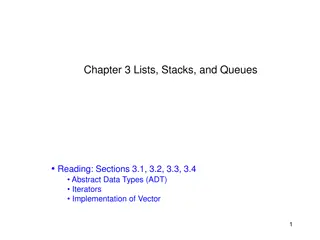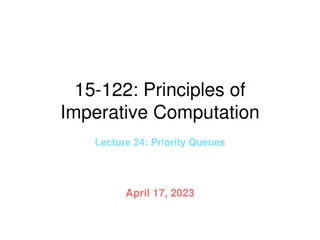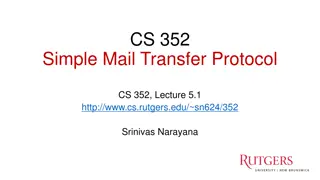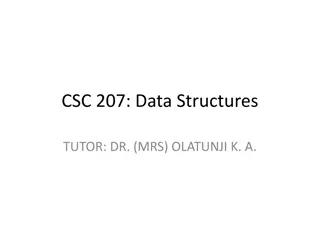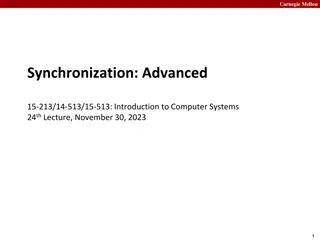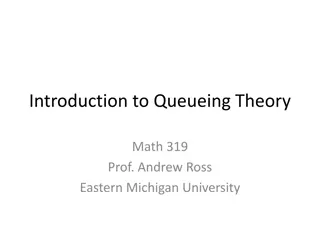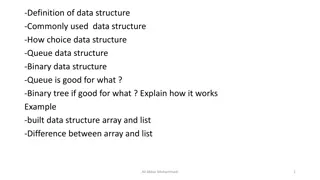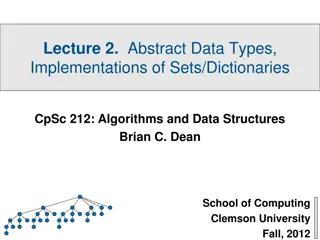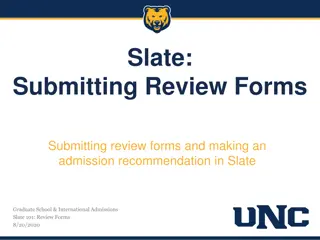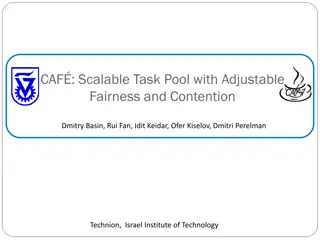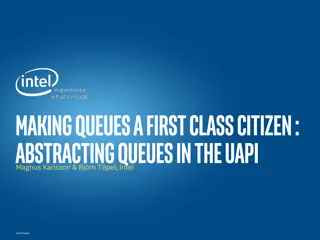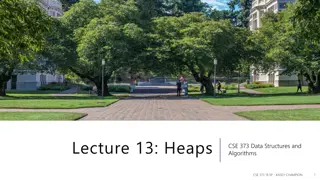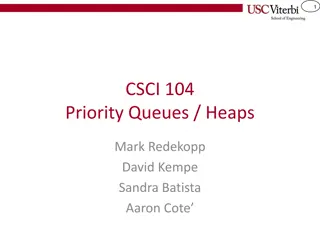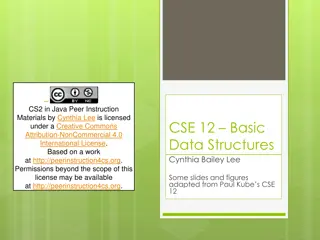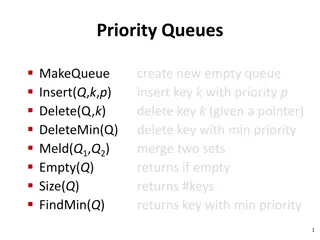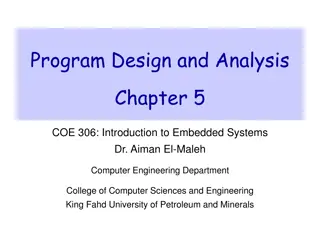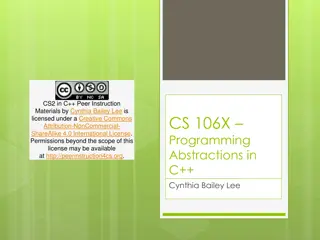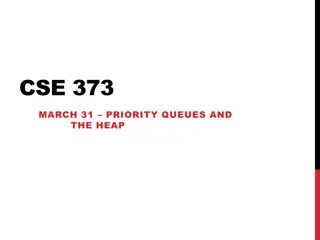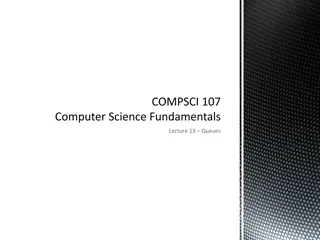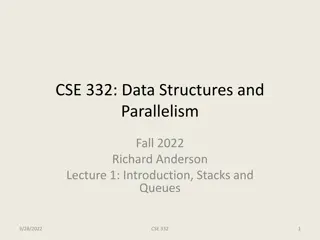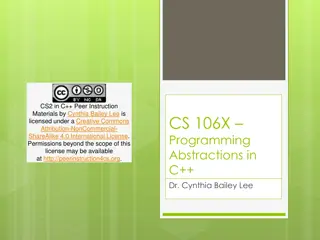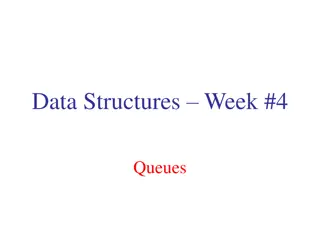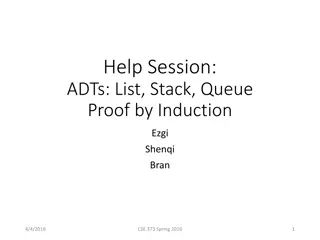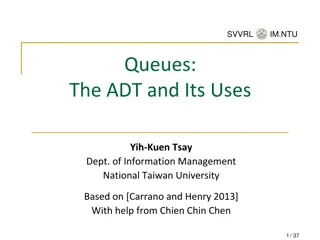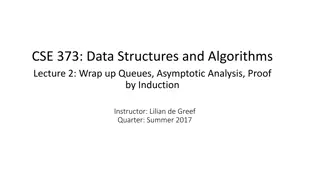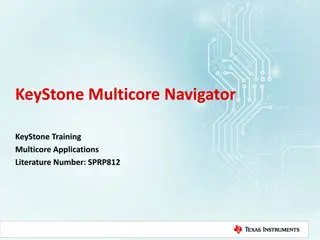Understanding Lists, Stacks, and Queues in Abstract Data Types
Explore the concepts of Abstract Data Types (ADT) related to lists, stacks, and queues. Learn about ADT definition, high-level data types, operations, iterators, and their implementations. Delve into the significance of iterators for navigating different data structures efficiently.
3 views • 21 slides
15-122: Principles of Imperative Computation.
Explore the fundamentals of priority queues, including how they prioritize elements based on specific criteria, such as emergencies or deadlines. Learn about key operations like adding and retrieving elements, with examples from different real-world scenarios. Delve into creating a Priority Queue In
1 views • 45 slides
Evolution of Operating Systems: From Mainframe Computers to Unix
Before the 1950s, users interacted directly with mainframe computers without an operating system, debugging using control panels. The transition to writing programs in symbolic languages led to the need for specific drivers. Run queues and operator-assisted job submissions marked this era. The first
0 views • 41 slides
Understanding Email Communication Protocol
Explore the workings of email communication through SMTP, user agents, mail servers, and message queues. Discover the process of sending and receiving emails between users like Alice and Bob, highlighting the role of servers in handling message delivery and retrieval.
0 views • 18 slides
Understanding Data Structures in CSC 207 with Dr. Olatunji K. A.
This course covers the objectives, learning outcomes, and contents related to data structures in CSC 207. Students will learn about data type specifications, representation techniques, algorithm analysis, recursive methods, and practical applications of data structures. The course delves into basic
1 views • 22 slides
Carnegie Mellon Synchronization and Computer Systems Lecture Updates
Carnegie Mellon's recent announcements include lab checkpoints and finals deadlines, as well as the release of an optional lab extension for the Shark File System. The lecture topics cover races, mutual exclusion, deadlock, semaphores, events, queues, reader-writer locks, starvation, and thread-safe
0 views • 43 slides
NASA Platform Layer Updates for the CAELUM (7.0) Release
The National Aeronautics and Space Administration (NASA) discusses platform layer updates for the CAELUM (7.0) release of the Core Flight System in the 2021 Flight Software Workshop. The platform layer consists of the Operating System Abstraction Layer (OSAL) and Platform Support Package (PSP), whic
1 views • 20 slides
Understanding Queueing Theory: Applications and Notations
Queueing theory is a mathematical study focused on predicting wait times and server configuration in systems with queues, such as telephone call centers, factories, and air travel. This theory helps in optimizing service levels and resource allocation to minimize waiting times and enhance efficiency
1 views • 32 slides
Understanding Queuing Theory and Its Applications in Operations Research
Queuing theory is a mathematical study of waiting lines, or queues, commonly applied in operations research to predict queue lengths and waiting times. It helps businesses make decisions regarding resource allocation for efficient service provision. This field also encompasses queue discipline and E
1 views • 10 slides
Understanding Data Structures: A Comprehensive Overview
Data structures are schemes for organizing data in a computer's memory, influencing program performance. Common structures like queues and binary trees are outlined, illustrating their organization and use cases. The choice of data structures impacts task efficiency, with programmers analyzing data
0 views • 20 slides
Understanding Data Structures in Computer Science
Explore the implementation of abstract data types and sets/dictionaries, emphasizing fundamental data structures like arrays and linked lists. Learn about array and linked list performance, circular arrays, queues, and stacks, and their practical applications in algorithms. Gain insights into the im
0 views • 16 slides
Slate Graduate School & International Admissions Review Forms Overview
Explore the process of submitting review forms and making admission recommendations in Slate Graduate School & International Admissions, including automatic assignment of applications to queues, review of Staff Review Forms, and recommending admission or denial through Faculty Review Forms. Learn ab
0 views • 8 slides
Scalable Task Pool with Adjustable Fairness
Explore CAF, a scalable task pool with adjustable fairness and contention, offering a solution to the inherent scalability problems of FIFO queues. The system allows for control over the level of relaxation, providing more fairness or less contention as needed. With a focus on bounded non-FIFO pools
5 views • 26 slides
Insights into Secondary School Menu Preferences for Autumn-Winter 2020
Exploring the new student-led menu for secondary schools by Food Union in collaboration with Chartwells. Analyzing responses by region to understand why students are not eating at school, addressing issues like long queues and meal preferences. Identifying common food concepts and preferences across
0 views • 22 slides
Abstracting Queues in the UApi for Improved Network Performance
Abstracting queues in the UApi is crucial for enabling more efficient traffic steering and management in network devices. The proposal aims to enhance the handling of queues by hiding or exposing them to user space, allowing for better scalability and flexibility in network configurations.
4 views • 8 slides
Essential Information on Text-to-911 System
Explore key details about the text-to-911 system, including capturing text conversations, handling abandoned calls, transferring text calls to queues, and managing text conversations effectively. Learn about system configurations, call release timings, and dispatcher capabilities in handling text me
0 views • 12 slides
Text-to-911 System Operations Quiz
Test your knowledge on Text-to-911 system operations with this quiz. Learn about capturing text conversations, handling abandoned calls, transferring calls to queues, text conversation timelines, and more. Enhance your understanding of the protocols and procedures involved in managing text-based eme
1 views • 12 slides
Understanding Priority Queues and Heaps in Java Collections
Explore the concepts of priority queues, heaps, and related data structures in Java Collections Framework. Learn about the Priority Queue class, Entry ADT, Comparator ADT, and Total Order Relations, along with their practical applications in process scheduling and more.
0 views • 44 slides
Understanding Heaps and Priority Queues in Data Structures
Exploring the concepts of heaps, priority queues, and the Priority Queue ADT in the context of data structures. Topics include the implementation of priority queues, comparing different data structures for efficiency, and the behavior of operations like insert and removeMin.
0 views • 40 slides
Understanding Priority Queues and Heaps in Java
Explore the concepts of priority queues, heaps, and their implementations in Java. Learn about efficiency tradeoffs, interface vs. implementation, and the primary operations of priority queues. Discover the importance of comparable elements and the various data structures used for efficient operatio
0 views • 49 slides
Understanding Priority Queues and Heaps in Data Structures
Priority queues prioritize item retrieval based on value, contrasting with traditional queues that follow a first-in-first-out approach. Priority queues efficiently manage items based on their importance, often utilized in scenarios like emergency rooms or air traffic control. Heaps, a form of binar
0 views • 20 slides
Understanding Priority Queues and Heaps
Priority queues differ from regular queues by maintaining an ordering of items based on priority rather than first-in-first-out. Items in a priority queue are assigned priority values and the highest priority item is removed first. Different data structures can be used to efficiently insert and remo
0 views • 54 slides
Understanding Priority Queues and Heaps in Data Structures
Priority Queues are data structures that support operations like Enqueue, Dequeue, Insert, and deleteMin, where elements are ordered based on priority. This article covers various aspects of Priority Queues, including their implementation, applications in operating systems, and the concept of Binary
0 views • 25 slides
Understanding Priority Queues and Heap Data Structures
Priority queues play a key role in computer science algorithms by managing data based on priority levels. The use of heap data structures enhances the efficiency of priority queue operations. This tutorial covers the basics of priority queues, their applications, different implementations such as li
0 views • 30 slides
Priority Queues in Java: Implementation and Use Cases
Explore the concept of priority queues in Java, covering implementations using unsorted and sorted linked lists, as well as heaps. Learn about the differences between a queue and a priority queue through reading quizzes and discover various priority queue implementation options. Dive into priority q
1 views • 42 slides
Priority Queues: Operations and Implementations
Priority queues are data structures that allow efficient insertion, deletion, and retrieval of elements based on their priority. This information-rich content covers various aspects of priority queues, including ideal times, binomial queues, Dijkstra's algorithm for single-source shortest paths, and
0 views • 11 slides
Introduction to Embedded Systems and Software Components
Embedded systems play a crucial role in various applications, with components like state machines, circular buffers, and queues being essential. State machines help in maintaining system behavior, while circular buffers are useful in digital signal processing. The use of queues aids in managing task
0 views • 78 slides
Understanding Priority Queues and B-Trees in Data Structures
Explore the concepts of priority queues and B-Trees, including rigorous problem-solving in homework assignments. Discover the key elements of B-Trees, their implementation, and benefits. Gain insights into memory architecture considerations and the importance of properly aligning nodes. Learn about
1 views • 82 slides
Understanding Queues and Stacks in C++
Explore the concepts of queues and stacks in the context of programming in C++ with insights on their differences, applications like event queues, and a fun puzzle involving queues. Learn about FIFO and LIFO structures, and how they are used in various scenarios like hospital queues and boarding pro
0 views • 17 slides
Understanding Priority Queues and Heaps in CS2110
Delve into the realm of priority queues and heaps in the context of CS2110 during the Fall of 2015. Explore the differences between heaps and Binary Search Trees (BSTs) through desirable properties and advantages each structure offers. Discover how stacks and queues are implemented as restricted lis
1 views • 50 slides
Understanding Priority Queues and Heaps in Data Structures
Exploring the concepts of priority queues, heaps, and various data structures like linked lists, binary search trees, and interfaces like Bag. The content covers comparisons between BSTs and heaps, efficiency purposes in data structures, and implementations of stacks and queues. Learn about the sign
0 views • 50 slides
Understanding Priority Queues and Heaps in CSE 373 Lecture
Today's lecture in CSE 373 covers the Priority Queue Abstract Data Type (ADT), the properties of heaps, and their implementations. Key topics include the completeness property of heaps, different priority queue implementations such as the binary search tree for faster insert and find operations, and
0 views • 21 slides
Understanding Queues in Computer Science: Principles and Implementations
Explore the concept of queues in computer science, focusing on ordered collections of data following the FIFO principle. Learn about queue ADTs, implementations in Python, and delve into a simulation of a Printer Queue problem. Discover how to model printing tasks as random events and analyze the im
0 views • 15 slides
Introduction to CSE 332: Data Structures and Parallelism with Richard Anderson
Welcome to CSE 332: Data Structures and Parallelism with Richard Anderson! This course covers fundamental data structures, algorithms, efficiency analysis, and when to use them. Topics include queues, dictionaries, graphs, sorting, parallelism, concurrency, and NP-Completeness. The outline includes
0 views • 29 slides
Understanding C++ Data Structures and Programming Concepts
Explore key programming concepts in C++, including event queues, linear and associative containers, and the implementation of the Map ADT. Learn about the usage of queues for event handling, different categories of Abstract Data Types (ADTs), and the distinction between linear and associative contai
0 views • 16 slides
Understanding Queues: Operations, Implementations, and Applications
Explore the world of queues, a fundamental data structure with operations like enqueue and dequeue, and implementations using arrays or linked lists. Dive into the applications of queues and their significance in various scenarios. Uncover the basics of queue operations and their practical implicati
0 views • 30 slides
Understanding ADTs: Lists, Stacks, and Queues - Implementation and Operations
Explore the world of Abstract Data Types (ADTs) - Lists, Stacks, and Queues, focusing on their operations like adding, removing, and accessing elements. Learn the differences between array and linked list implementations, along with insights on how to manipulate data structure implementations. Dive
0 views • 18 slides
Understanding Queues in ADT: A Comprehensive Overview
Queues, an abstract data type (ADT), play a crucial role in computer science and real-world scenarios. This article explores the concept of queues, their properties like FIFO (First-in, First-out), and common operations associated with them. Through illustrations and explanations, you will gain a de
0 views • 37 slides
CSE 373 Data Structures and Algorithms Lecture Wrap-up: Queues, Asymptotic Analysis, Proof by Induction
In this lecture, we wrapped up discussions on queues, started asymptotic analysis including Big-O notation, and delved into proof by induction. The instructor, Lilian de Greef, covered various topics essential for understanding data structures and algorithms. Additionally, announcements were made re
0 views • 32 slides
Understanding KeyStone Multicore Navigator for Efficient Data Transport
This lesson provides insights into the KeyStone Multicore Navigator, explaining its advantages, architecture, functional components like descriptors and queues, and how to configure it for optimal performance. It covers the motivation behind its design, basic elements such as descriptors and queues,
0 views • 55 slides
